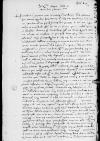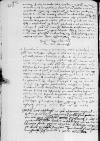Post reditum Löbau (Lubawa, Lubavia), town in northern Poland, Kulm Land (Ziemia Chełmińska), ca. 67 km E of Graudenz (Grudziądz), the main seat of the bishops of Kulm (Chełmno)⌊hucLöbau (Lubawa, Lubavia), town in northern Poland, Kulm Land (Ziemia Chełmińska), ca. 67 km E of Graudenz (Grudziądz), the main seat of the bishops of Kulm (Chełmno)⌋ meum quidam Royal Prussia (Prussia Regalis), region, part of Prussia annexed to the Kingdom of Poland in 1466 under the provisions of the Second Peace of Thorn⌊harum terrarumRoyal Prussia (Prussia Regalis), region, part of Prussia annexed to the Kingdom of Poland in 1466 under the provisions of the Second Peace of Thorn⌋ Serenissimae Maiestatis Vestrae consiliarii[1] litteris suis mihi significarunt ea, quae de Provincial Diet of Royal Prussia ⌊futuro hic conventuProvincial Diet of Royal Prussia ⌋ Serenissimae Maiestati Vestrae suggerenda et consulenda essent, de loco in primis, qui eis videtur aptior et commodior Thorn (Toruń, Thorunium), city in northern Poland, on the Vistula river in its lower reaches, main residence of the bishops of Kulm (Chełmno); one of the three Great Prussian Cities (along with Gdańsk and Elbing) which had representatives in the Council of Royal Prussia; a member of the Hanseatic League⌊ThoroniaeThorn (Toruń, Thorunium), city in northern Poland, on the Vistula river in its lower reaches, main residence of the bishops of Kulm (Chełmno); one of the three Great Prussian Cities (along with Gdańsk and Elbing) which had representatives in the Council of Royal Prussia; a member of the Hanseatic League⌋, quam Marienburg (Malbork), town and castle in northern Poland, Pomeranian Voivodeship, on the Nogat river, a branch of the Vistula at its delta, the capital of the Grand Masters of the Teutonic Order in Prussia (1309-1457), a voivodeship capital in Royal Prussia, which belonged to the Kingdom of Poland (1466-1772). Marienburg (taking turns with Graudenz (Grudziądz)) was the venue for the Provincial Diets of Royal Prussia, which were chaired by the bishop of Ermland (Warmia)⌊MarienburgiMarienburg (Malbork), town and castle in northern Poland, Pomeranian Voivodeship, on the Nogat river, a branch of the Vistula at its delta, the capital of the Grand Masters of the Teutonic Order in Prussia (1309-1457), a voivodeship capital in Royal Prussia, which belonged to the Kingdom of Poland (1466-1772). Marienburg (taking turns with Graudenz (Grudziądz)) was the venue for the Provincial Diets of Royal Prussia, which were chaired by the bishop of Ermland (Warmia)⌋, propter eos dominos, quos Serenissima Maiestas Vestra ad nos est missura[2]. Et, cum tempus breve est pro 1537-05-08⌊divi Stanislai festo VIII-a Maii1537-05-08⌋ praemittendaeque sint Serenissimae Maiestatis Vestrae litterae et mandata, quibus trium districtuum nobilitas maioresque et minores civitates sunt ad Provincial Diet of Royal Prussia ⌊conventumProvincial Diet of Royal Prussia ⌋ vocandae, oportunum illis visum est, ut tempus et dies conventus transferretur in 1537-05-24⌊quintam1537-05-24⌋ aut 1537-05-25⌊sextam1537-05-25⌋ feriam post 1537-05-20⌊Penthecosten1537-05-20⌋[3], quodque per nobilitatem districtuum ad eos nuntios[4], qui nuper apud Serenissimam Maiestatem Vestram fuerant Cracow (Kraków, Cracovia), city in southern Poland, Małopolska, on the Vistula river, from 1038 capital of the Kingdom of Poland⌊CracoviaeCracow (Kraków, Cracovia), city in southern Poland, Małopolska, on the Vistula river, from 1038 capital of the Kingdom of Poland⌋, quidam alii eligerentur ac mitterentur.
Praeterea, ut tandem Serenissima Maiestas Vestra serio exactoribus prioris contributionis mandaret, quod iam a Serenissima Maiestate factum est aliquotie{n}s, quo rationem Council of Royal Prussia the most important local authority in Royal Prussia. It consisted of two bishops (of Ermland (Warmia), who served as the Council’s president, and of Kulm (Chełmno)), three voivodes (of Kulm, Marienburg (Malbork), and Pomerania), three castellans (of Kulm, Elbing (Elbląg), and Gdańsk (Danzig)), three chamberlains (of Kulm, Marienburg, and Pomerania), and representatives of the three Great Prussian Cities – Gdańsk, Thorn (Toruń), and Elbing (ACHREMCZYK 2016, p. 17-18)⌊dominis consiliariisCouncil of Royal Prussia the most important local authority in Royal Prussia. It consisted of two bishops (of Ermland (Warmia), who served as the Council’s president, and of Kulm (Chełmno)), three voivodes (of Kulm, Marienburg (Malbork), and Pomerania), three castellans (of Kulm, Elbing (Elbląg), and Gdańsk (Danzig)), three chamberlains (of Kulm, Marienburg, and Pomerania), and representatives of the three Great Prussian Cities – Gdańsk, Thorn (Toruń), and Elbing (ACHREMCZYK 2016, p. 17-18)⌋ in Provincial Diet of Royal Prussia ⌊futuro conventuProvincial Diet of Royal Prussia ⌋ de perceptis redderent, unde certo sciri possit, qui contribuerint et qui omissi aut qui contribuere neglexerint, ut in contributione instituenda iustior ordo, quam in priori, servaretur.
Consulunt item et humillime rogant, dominis ex Poland (Kingdom of Poland, Polonia)⌊RegnoPoland (Kingdom of Poland, Polonia)⌋ ad nos venturis Serenissima Maiestas Vestra velit iniungere, quemadmodum nuntiis nobilitatis nuper Cracow (Kraków, Cracovia), city in southern Poland, Małopolska, on the Vistula river, from 1038 capital of the Kingdom of Poland⌊CracoviaeCracow (Kraków, Cracovia), city in southern Poland, Małopolska, on the Vistula river, from 1038 capital of the Kingdom of Poland⌋ a Serenissima Maiestate Vestra fuerat responsum, ut diligenter inquirerent, qui sint isti ex nomine, per quos hic apud nos factiones, conuenticula atque dissensiones ac odia inter nobilitatem et civitates, contraque Council of Royal Prussia the most important local authority in Royal Prussia. It consisted of two bishops (of Ermland (Warmia), who served as the Council’s president, and of Kulm (Chełmno)), three voivodes (of Kulm, Marienburg (Malbork), and Pomerania), three castellans (of Kulm, Elbing (Elbląg), and Gdańsk (Danzig)), three chamberlains (of Kulm, Marienburg, and Pomerania), and representatives of the three Great Prussian Cities – Gdańsk, Thorn (Toruń), and Elbing (ACHREMCZYK 2016, p. 17-18)⌊dominos consiliariosCouncil of Royal Prussia the most important local authority in Royal Prussia. It consisted of two bishops (of Ermland (Warmia), who served as the Council’s president, and of Kulm (Chełmno)), three voivodes (of Kulm, Marienburg (Malbork), and Pomerania), three castellans (of Kulm, Elbing (Elbląg), and Gdańsk (Danzig)), three chamberlains (of Kulm, Marienburg, and Pomerania), and representatives of the three Great Prussian Cities – Gdańsk, Thorn (Toruń), and Elbing (ACHREMCZYK 2016, p. 17-18)⌋ simultates exerceantur et excitentur, compertique voluntati et iudicio Serenissimae Maiestatis Vestrae deferantur, sicque tractentur, ut aliis sint exemplo, ne istiusmodi turbulentos et sediciosos sibi animos assumere praesumant.
Petunt insuper a Serenissima Maiestate Vestra suppliciter, dignetur etiam eisdem ex Poland (Kingdom of Poland, Polonia)⌊RegnoPoland (Kingdom of Poland, Polonia)⌋ dominis committere causam violentiarum, quibus usus est Sigismundus Grudziński ⌊Sigismundus GrudzinskiSigismundus Grudziński ⌋ ex Poland (Kingdom of Poland, Polonia)⌊RegniPoland (Kingdom of Poland, Polonia)⌋ districtu Krajna, province on the right bank of the Noteć river and the left bank of the Gwda, historical territory, in the 15th-18th centuries comprised Nakło district in Kalisz province⌊CraynoKrajna, province on the right bank of the Noteć river and the left bank of the Gwda, historical territory, in the 15th-18th centuries comprised Nakło district in Kalisz province⌋ in Pomerania⌊districtum PomeraniaePomerania⌋, ubi nobili Mathias Pyschinski (Maciej Pisiński, Mathias de Renglyn), nobleman from Pomerania⌊Mathiae PyschinskiMathias Pyschinski (Maciej Pisiński, Mathias de Renglyn), nobleman from Pomerania⌋ sine iure aut aliqua praemonitione, nocturno tempore, multis comitatus in bona eius irruens violenter rusticum cum pecoribus et omnibus, quae habuit, abduxit. Cuius rei querelae, quamvis saepius sint ad Serenissimam Maiestatem Vestram perlatae, tamen hucusque Sigismundus Grudziński ⌊idem GrudzinskiSigismundus Grudziński ⌋ ad standum iuri numquam compelli potuit, verendumque est, nisi causa ista per dominos mittendos sopiatur, ne iterum novae grassationes utrimque suboriantur.
Petunt et hoc, quod potissimum est, Serenissima Maiestas Vestra dignetur venturis dominis dare in mandatis, ut se cum aliis hic Serenissimae Maiestatis Vestrae consiliariis in omnibus conforment
 BCz, 244, p. 202
mutuoque de rebus tractandis habito consilio sic se gerant, ne Serenissimae Maiestatis Vestrae auctoritas in suis hic consiliariis elevetur, sed contra rebelles et novare omnia contendentes magis atque magis firmetur. Sic demum hic sperandum erit inoboedientes Serenissimae Maiestati ms. M(aiesta)tis(!)
⌈MaiestatiMaiestati ms. M(aiesta)tis(!)
⌉ Vestrae auctoresque seditionum in ordinem redigi posse eaque or cunctaque⌈eaqueeaque or cunctaque⌉, cunctaque in posterum tranquilliora futura. Haec quorundam Council of Royal Prussia the most important local authority in Royal Prussia. It consisted of two bishops (of Ermland (Warmia), who served as the Council’s president, and of Kulm (Chełmno)), three voivodes (of Kulm, Marienburg (Malbork), and Pomerania), three castellans (of Kulm, Elbing (Elbląg), and Gdańsk (Danzig)), three chamberlains (of Kulm, Marienburg, and Pomerania), and representatives of the three Great Prussian Cities – Gdańsk, Thorn (Toruń), and Elbing (ACHREMCZYK 2016, p. 17-18)⌊hic dominorum superinscribed⌈dominorumdominorum superinscribed⌉ consiliariorumCouncil of Royal Prussia the most important local authority in Royal Prussia. It consisted of two bishops (of Ermland (Warmia), who served as the Council’s president, and of Kulm (Chełmno)), three voivodes (of Kulm, Marienburg (Malbork), and Pomerania), three castellans (of Kulm, Elbing (Elbląg), and Gdańsk (Danzig)), three chamberlains (of Kulm, Marienburg, and Pomerania), and representatives of the three Great Prussian Cities – Gdańsk, Thorn (Toruń), and Elbing (ACHREMCZYK 2016, p. 17-18)⌋ bene perpensa consilia, cum et mihi, pro rudi meo iudicio, his temporibus et rebus videantur satis commoda, quemadmodum a me postulatum est, in notitiam Serenissimae Maiestatis Vestrae humillime deducenda existimavi. Cui me ut domino meo clementissimo suppliciter commendo, Deumque precor, ut nobis eandem Serenissimam Maiestatem Vestram quam diutissime in valetudine atque omnis felicitatis prosperrima accessione conservet.
BCz, 244, p. 202
mutuoque de rebus tractandis habito consilio sic se gerant, ne Serenissimae Maiestatis Vestrae auctoritas in suis hic consiliariis elevetur, sed contra rebelles et novare omnia contendentes magis atque magis firmetur. Sic demum hic sperandum erit inoboedientes Serenissimae Maiestati ms. M(aiesta)tis(!)
⌈MaiestatiMaiestati ms. M(aiesta)tis(!)
⌉ Vestrae auctoresque seditionum in ordinem redigi posse eaque or cunctaque⌈eaqueeaque or cunctaque⌉, cunctaque in posterum tranquilliora futura. Haec quorundam Council of Royal Prussia the most important local authority in Royal Prussia. It consisted of two bishops (of Ermland (Warmia), who served as the Council’s president, and of Kulm (Chełmno)), three voivodes (of Kulm, Marienburg (Malbork), and Pomerania), three castellans (of Kulm, Elbing (Elbląg), and Gdańsk (Danzig)), three chamberlains (of Kulm, Marienburg, and Pomerania), and representatives of the three Great Prussian Cities – Gdańsk, Thorn (Toruń), and Elbing (ACHREMCZYK 2016, p. 17-18)⌊hic dominorum superinscribed⌈dominorumdominorum superinscribed⌉ consiliariorumCouncil of Royal Prussia the most important local authority in Royal Prussia. It consisted of two bishops (of Ermland (Warmia), who served as the Council’s president, and of Kulm (Chełmno)), three voivodes (of Kulm, Marienburg (Malbork), and Pomerania), three castellans (of Kulm, Elbing (Elbląg), and Gdańsk (Danzig)), three chamberlains (of Kulm, Marienburg, and Pomerania), and representatives of the three Great Prussian Cities – Gdańsk, Thorn (Toruń), and Elbing (ACHREMCZYK 2016, p. 17-18)⌋ bene perpensa consilia, cum et mihi, pro rudi meo iudicio, his temporibus et rebus videantur satis commoda, quemadmodum a me postulatum est, in notitiam Serenissimae Maiestatis Vestrae humillime deducenda existimavi. Cui me ut domino meo clementissimo suppliciter commendo, Deumque precor, ut nobis eandem Serenissimam Maiestatem Vestram quam diutissime in valetudine atque omnis felicitatis prosperrima accessione conservet.
 BCz, 244, p. 202
mutuoque de rebus tractandis habito consilio sic se gerant, ne Serenissimae Maiestatis Vestrae auctoritas in suis hic consiliariis elevetur, sed contra rebelles et novare omnia contendentes magis atque magis firmetur. Sic demum hic sperandum erit inoboedientes Serenissimae Maiestati ms. M(aiesta)tis(!)
⌈MaiestatiMaiestati ms. M(aiesta)tis(!)
⌉ Vestrae auctoresque seditionum in ordinem redigi posse eaque or cunctaque⌈eaqueeaque or cunctaque⌉, cunctaque in posterum tranquilliora futura. Haec quorundam
BCz, 244, p. 202
mutuoque de rebus tractandis habito consilio sic se gerant, ne Serenissimae Maiestatis Vestrae auctoritas in suis hic consiliariis elevetur, sed contra rebelles et novare omnia contendentes magis atque magis firmetur. Sic demum hic sperandum erit inoboedientes Serenissimae Maiestati ms. M(aiesta)tis(!)
⌈MaiestatiMaiestati ms. M(aiesta)tis(!)
⌉ Vestrae auctoresque seditionum in ordinem redigi posse eaque or cunctaque⌈eaqueeaque or cunctaque⌉, cunctaque in posterum tranquilliora futura. Haec quorundam 
